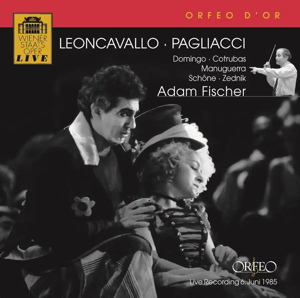
Ruggero Leoncavallo (1857-1919)
Pagliacci
Canio – Plácido Domingo (tenor)
Nedda – Ileana Cotrubaş (soprano)
Tonio – Matteo Manuguerra (baritone)
Peppe – Heinz Zednik (tenor)
Silvio – Wolfgang Schöne (baritone)
Chor der Wiener Staatsoper, Bühnenorchester der Wiener Staatsoper, Gumpoldskirchner Kinderchor
Orchester der Wiener Staatsoper/Adam Fischer
rec. live, 6 June 1985, Wiener Staatsoper, Vienna, Austria
Reviewed as download
Orfeo C240121 [74]
This performance of Leoncavallo’s Pagliacci has attained legendary status from the very beginning in 1985. It was one of the last productions at the Vienna State Opera directed by Jean-Pierre Ponnelle, and by all evidence it must have been a magic evening, in particular after the interval. Ponnelle had chosen the by now almost obligatory double bill with Mascagni’s Cavalleria rusticana and Pagliacci, and Cav was no mean opening either with the Argentinian tenor Luis Lima as a highly appreciated Turiddu. However, it was Plácido Domingo’s tormented Canio that was so overwhelming an achievement, that made the day. In the booklet there are abundant quotations from the reviews in the Viennese magazines and newspapers, and the agreement in their verdicts is so convincing that any further opinions seem superfluous – but seeing as well as hearing a performance on site can be quite different from only listening afterwards. The atmosphere and the reactions from the audience ar there of course – and they are overwhelming – but it has happened more than once that I have reviewed live performances with ecstatic ovations, and asked myself, “What’s all the fuss about?” The singing has been miserable, the readings have been undistinguished, and even the orchestra has been off-form.
Not so here, however. Stage noises are certainly a nuisance, and in the second act there are generous helpings of stamping and banging, which for those present was obvious where they emanated from. We listeners can only guess, but the intensity of the performance is so captivating that the disturbances hardly matter. Adam Fischer’s connection with the Vienna State Opera has been longstanding, beginning in 1973 when he was only 24 and in 2017 he was designated as Honorary Member of the Opera. That he was highly inspired in June ‘85 is very obvious from the first bars of the prologue and onwards, and the chorus and soloists respond likewise. The hunchback Tonio is the first character we encounter in the manifesto of the prologue, and he is sung by Matteo Manuguerra, certainly one of the best baritones of the 1970s and 1980s. He was already past 60 at the time, but his voice was still in sterling condition. He was a late starter, not beginning his training until he was 35, and was still active when he died of a heart attack aged 74. His prologue is one of most thrilling readings I’ve heard, the top notes ringing out with great brilliance – even though I’ve heard other singers probing deeper into the character’s mind.
Another favourite singer I have admired for many years is Romanian lyric soprano Ileana Cotrubaş. Her Despina, Susanna, Adina, Gilda, Violetta and Micaela, to mention some favourites in my collection, are hard to beat, several of them opposite Domingo. By the time this recording was made, she had ventured into more dramatic roles, and only weeks before this Nedda in Vienna, I heard her at Covent Garden as a very good Elisabetta in Don Carlo, once available on DVD. We can enjoy both the girlish lightness of the former and the added heft of the latter in her Nedda.. As an extra bonus, we encounter a nuanced and expressive – and very personal – Silvio in the shape of Wolfgang Schöne, a role that is often undercast at live performances, and the excellent character singer Heinz Zednik as Peppe. He is of course masterly with Arlecchino’s pranks in the second act’s comedy, but also sings his serenade with both lyrical warmth and beauty.
In the midst of all this it is the upsetting portrait of Canio, the clown who in his despair can no longer distinguish the actor from his own personality and in the end kills his wife and her lover in front of the audience. Let me say straight away that Plácido Domingo is formidable in the role. It is a hackneyed expression that he is Canio, but in this instance it is the only imaginable description for his assumption of the role. His desperation is so tangible throughout the performance that one wonders if he will manage to carry through his task without collapsing, he is so deeply involved. At the same time, he is in full control of his means of expression. He never overacts, even though he at times is close to the point of bursting, and he had me sitting on the edge of my seat from beginning to end. He must have been totally exhausted – and I believe that it took him considerable time to mentally step out of the jester’s costume and resume his identity. It must have had an even more bewildering experience for the audience at the Staatsoper on 6th June 1985 – and the tumultuous ovations bear witness to that.
There are many excellent recordings of Pagliacci available on the market, from the earliest days of acoustical recordings until the present, and collectors already have their own favourites, I’m sure, but this forty-year-old version is worth adding to the collection for the sake of Plácido Domingo’s magnificent reading – and into the bargain you get excellent performances of the other roles by some of the greatest voices of that era.
Göran Forsling
Previous review: Ralph Moore (May 2025)
Buying this recording via a link below generates revenue for MWI, which helps the site remain free.




















